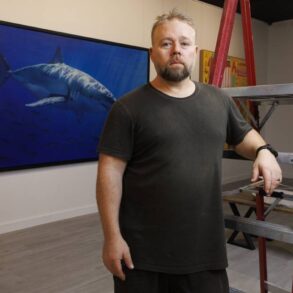Raise your hand if you have at least one interesting story inside of you.
*Everyone’s hand raises*
Keep your hand raised if you think it would make a good book!
*90% of hands stay raised*
Almost everyone believes they have a book-worthy story. And the truth is, most people actually do! However, estimates show that only 1% of submitted manuscripts to book publishers ever get a deal.
So then, what makes a good book? And who is deciding?
Regina Brooks, a resident of Bedford Stuyvesant and owner of Serendipity Literary Agency, says it’s not just about being a great writer or having an interesting story. Today, one of the most important considerations by publishers of a winning title is the author’s platform.
“A platform shows you have an audience already interested in your topic, making you the ideal person to write this book,” Brooks explained. And she would know: Serendipity is the largest Black-owned literary agency in the country.
Founded in 2000, Serendipity’s success is owed to Brooks and her knack for seeing potential in the unobvious and often obscure. “I named my company ‘Serendipity’ because it’s about finding valuable things you weren’t looking for,” she said.
In fact, Brook’s own career journey to finding her true calling is the literal definition of good fortune in accidental discovery!
Initially, Brooks– who describes herself as “right brain/left brain”– aspired to be a Broadway star. In Rochester, NY, where she grew up during the 70s and 80s, she attended The School of the Arts High School, majoring in theater, dance and voice. While still in high school, she made frequent trips to New York City to audition for commercials.
But, Brooks said, “My mom was like, ‘Ummm, why don’t you let the arts be your plan B?’ And since I always loved science too, I decided to major in aerospace engineering in college.” Brooks went on to become the first Black woman to earn a bachelor’s degree in aerospace engineering from Ohio State University.
After graduating from college, Brooks worked at National Aeronautics and Space Administration’s Goddard Space Flight Center in Maryland, with plans of becoming an astronaut. A colleague and mentor suggested she specialize further in her field, and so she applied for, and was accepted into, an advanced degree program in aerospace medicine.
But the summer before starting school, on a whim, she enrolled in Howard University’s Book Publishing Program, hoping for a little creative arts break. Little did she know, but that whimsical decision would change her entire career trajectory.
Unexpectedly, she fell in love with publishing. The idea of spending most of her time reading and learning from a variety of disparate topics while having a hand in shaping the way these stories are told and cultivating the voices that tell them was … right up her alley!
“As much as I loved aerospace, I wanted to use my whole self and publishing allowed that,” she said.
Following a year-long stint working as a sales rep at the publishing company John Wiley & Sons in Washington, D.C., Brooks was transferred to their New York office where she worked as an acquisitions editor. It was just before the dot-com boom when the race amongst the top computer languages was in motion. The publishing company only had a few computer science books “on Pascal and Fortran,” languages, said Brooks. So she added Java and other scripts, building out their catalog of computer science titles, giving the publishing house the competitive edge it needed.
Soon, she was also sourcing books for aerospace engineering, mechanical engineering and electrical engineering. “I would go around the country and talk to all these engineering professors and encourage them to write books,” she said.
Now in her late 20s and already a juggernaut in the publishing industry, Brooks then partnered with a Harvard professor to create a course at the university for doctors preparing to write books. With her science background, she helped them think about the best ways to frame their content while teaching them the business of publishing. The course was a hit, attracting some of the country’s top doctors who flew into Boston every year for the course.
Meanwhile, just up the street from Brooks’ apartment in Fort Greene, Brooklyn, the Black arts scene was exploding. She attended poetry readings and other cultural events at cafes and watering holes like Brooklyn Moon and Frank’s Lounge on Fulton Street– places that nursed the early careers of artists, including Mums, Saul Williams and Jessica Care Moore and attracted celebrities like Common, Mos Def and Erykah Badu.
Brooks launched Serendipity Literary Agency and began to scout talent from both her science world and Brooklyn’s burgeoning arts scene. Her gift was (and still is) her ability to see a match between the core talents of would-be authors and the evolving interests and needs of book buyers.
“A lot of African Americans will come to me and immediately want to do a memoir,” Brooks said. “And that’s okay. But I might say something back like, ‘Okay, but aren’t you also into dogs? We don’t have a book yet for African Americans who are into dogs, and that market is very fertile.’”
She thinks creatively while staying rooted in data. When she hears “I have something interesting or valuable to share,” from hypothesis to proof, she evaluates whether the temperature and acceleration of the subject with an audience will either have gravity, provide oxygen or evaporate like gas.
By staying rooted in facts, Brooks acknowledges that books aren’t the first go-to for information. “If you have an ailment, your first instinct now is to go on Google or Web MD to give you answers,” Brooks said. “If you don’t get all of your answers there, you may ask a friend. Going to a book is probably like your third or fourth step in that process.
“People will [first try to] find a way to get information outside of paying the $25-$30 for the book.”
So, then, are people buying books anymore?
Regina Brooks says, “Yes!” But the key to uncovering a best-seller in today’s digital age is in the art of the sell and the science of the market configuration. And Brooks literally lives between both worlds.
That’s why she’s been able to grow Serendipity into the largest African-American-owned literary agency in the country, with a roster of award-winning authors in various genres of adult fiction and non-fiction and children’s literature, including Derrick Barnes, Will Packer, Jenny Wang, Dick Gregory, Mia Araujo, Jessica Care Moore and most recently, Bed-Stuy’s very own Dr. Robert Gore.
Brooks’ accomplishments have not gone unnoticed. She is the newly appointed president of the Association of American Literary Agents (AALA); and she sits on the boards of the Literary Agents of Change (LAOC), the Association of Writers & Writing Programs (AWP), Authors Against Book Bans (AABB) and the National Book Foundation’s Book Council.
“I love this job, because I’m super curious and I love learning,” said Brooks. “And that’s the beautiful thing about agenting is you’re always working with best-in-class or experts in any given area, because those are the people who want to write books.”
In a sense, this scientist and literary agent has created a little Broadway of her own– a platform to allow talent to shine.
This post was originally published on this site be sure to check out more of their content







